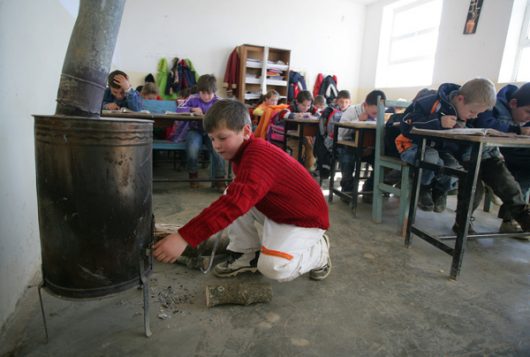Education in Albania
 Education in modern Albania is the culmination of successful economic growth and political reform. However, lingering issues such as geographical disparities and low wages for teachers highlight the continuous need to push for systemic improvement. Seeking solutions to these challenges, various sectors of the Albanian government have partnered with international organizations including UNICEF. They are currently working to ensure higher quality and more accessible education in the near future.
Education in modern Albania is the culmination of successful economic growth and political reform. However, lingering issues such as geographical disparities and low wages for teachers highlight the continuous need to push for systemic improvement. Seeking solutions to these challenges, various sectors of the Albanian government have partnered with international organizations including UNICEF. They are currently working to ensure higher quality and more accessible education in the near future.
Rural vs. Urban
Geographical inequalities continue to reinforce gaps in education levels and attempted reform. While urban areas benefit from a wealth of public services and industries, rural regions overwhelmingly lack basic infrastructure, employment opportunities and overall economic support that are needed to sustain schools and educational programs. In the peripheral rural areas of Albania, many schools do not have access to adequate equipment, furniture, technology, or facilities directly related to the quality of learning, which has consistently produced low enrollment rates and dwindling numbers of graduates. Only 47% of computers have an internet connection in rural Albania, which is a sharp contrast to 70% in North Macedonia and 94% on average in countries such as the United States and Japan.
The poor quality of roads and transportation typical of remote rural areas also discourage students from attending school, counteracting long-standing efforts to consolidate schools in the interest of providing better learning opportunities. However, many students in rural Albania are still dependent on these consolidated schools, called collective classes, to support their education. This has become an issue for their parents, many of whom cannot afford to take measures to transfer their children to other schools as collective classes become increasingly unavailable following the Ministry of Education’s campaign to close approximately 350 of them due to poor performance.
On average, students from urban areas attain two more years of schooling than those in rural areas and demonstrate higher performance in the state matura exam in all categories, including the Albanian language and mathematics.
Low Teacher Salaries
Teachers in Albania currently earn a lower average salary than other professions. In 2023, the average gross salary of a teacher was about 71,000 lek ($766), which is around 14% lower than the average salary in the public sector. This issue has worsened considerably, with the salary gap between teachers and the public sector average growing from 11% in 2022.
The lack of financial motivation has translated to lower quality education. Despite improvement in student-to-teacher ratios from 1990 to 2023, the academic achievements of Albanian students in the international PISA test of 2022 were recorded as having been the lowest in two decades. Low wages in education have resulted in hundreds of teacher vacancies and have obstructed recruitment efforts, leaving students to depend on frequent changes to curricula in preparing for state exams.
In recent years, teachers who have continued to work despite these conditions have begun to publicly express their discontent. On May 1, 2024, several employee unions engaged in peaceful protests outside the Ministry of Education building to call for several changes to the existing education system, including better teacher salaries, public education funding, and compensation covering transportation costs. Protests and strikes are expected to continue in 2024 without substantial reform by the state.
Seeking Solutions: UNICEF
Today, the Albanian government continues to attempt to reduce challenges to the current state of education, notably with the help of organizations such as UNICEF. On June 27, 2024, UNICEF partnered with the Ministry of Education, central and local government, and civil society to create a more equitable and accessible education system, focusing on preventing school drop-outs by targeting low-performing and at-risk children. By establishing relationships on a national and local scale, UNICEF has been able to bridge government representatives and communities together to better address education infrastructure decision-making. In 2023, a project between USAID, UNICEF and the Ministry of Education and Sports allowed students from various schools to meet directly with mayors from the Korça, Dibra, Roskovec, Elbasan and Gjirokastra municipalities to discuss solutions to pressing school infrastructure issues and educational needs. These conversations have been crucial in pushing for ongoing cooperation with stakeholders to improve the lack of necessary tools and resources for students across the nation.
Conclusion
Although Albania has made strides in education reform, disparities still persist among rural communities and teachers.
However, with the continued help of international institutions such as UNICEF, education in Albania has great potential to undergo impactful positive change, which will ultimately strengthen Albania’s economy and social welfare.
– Morgan Leahy, Moon Jung Kim
Photo: Flickr
Updated: July 10, 2024
